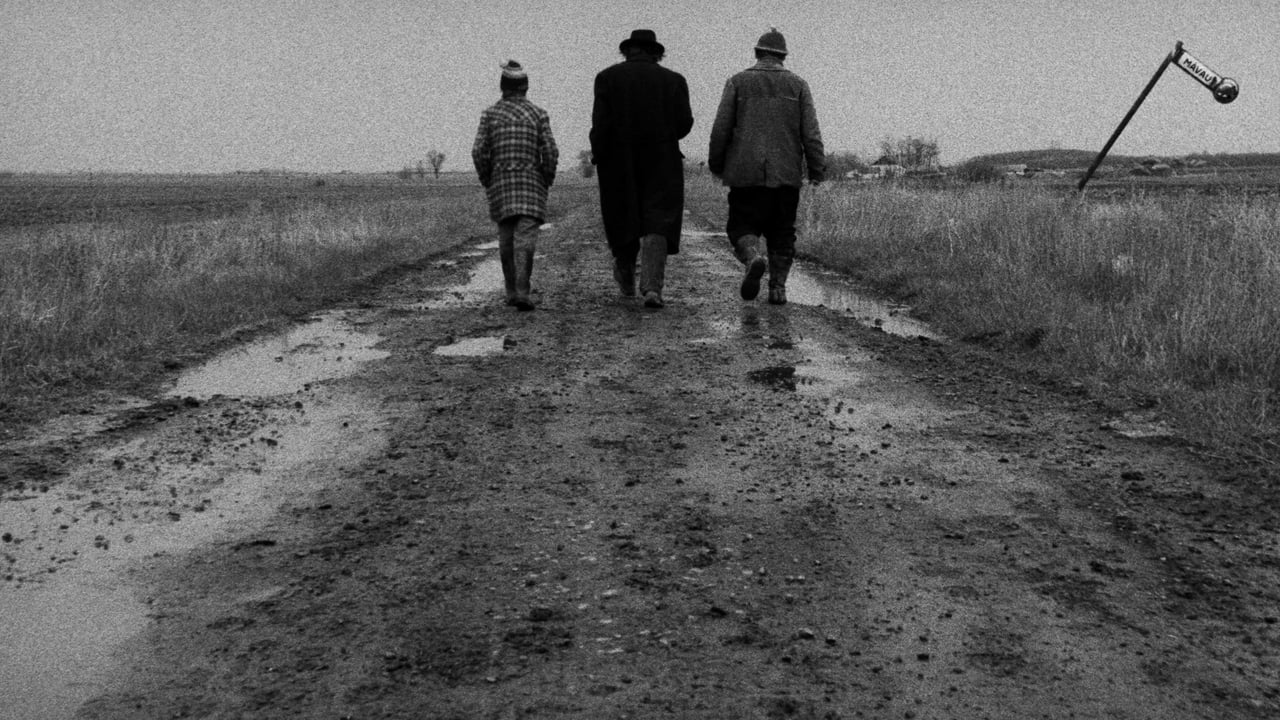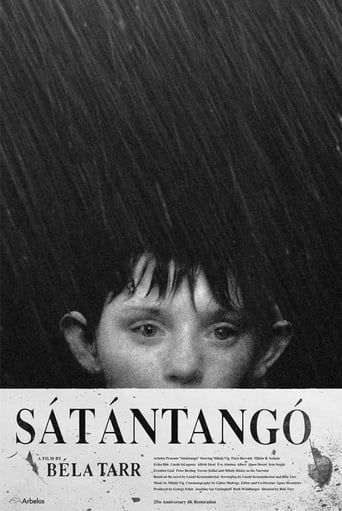

The greatest movie ever made..!
... View MoreI enjoyed watching this film and would recommend other to give it a try , (as I am) but this movie, although enjoyable to watch due to the better than average acting fails to add anything new to its storyline that is all too familiar to these types of movies.
... View MoreThe movie turns out to be a little better than the average. Starting from a romantic formula often seen in the cinema, it ends in the most predictable (and somewhat bland) way.
... View MoreLet me be very fair here, this is not the best movie in my opinion. But, this movie is fun, it has purpose and is very enjoyable to watch.
... View Moreit would be about time that so-called "artistic" goals stopped being achieved by using animal turture. This movie uses this little "nice" trick and every time i see that in movies i think: is it REALLY needed it? does it REALLY add value to the movie? but especially, i think: what is wrong with Bela Tarr and all those directors who speculate on the lives of animals for a movie's sake? And btw im not a PETA guy... What is wrong with all you people giving 10 stars to this marathon of stale cinema? It's true that the movie has something appreciable and quite rare to find compared to what can be found by the average movies nowadays, but I also think after reading most of the comments. it's been WAY WAY WAY OVERVALUED..FAR FROM A MASTERPIECE... Let's face it.. all that length was not necessary... 5 in my opinion.
... View MoreThis Hungarian film was listed in the book 1001 Movies You Must See Before You Die, it is most likely I would never have heard of or even watched this, and despite the length I was determined to try it. Basically, set in 1980's, Hungary, in a small ruined and decaying village, at the time near the end of Communism, the farming community is gradually collapsing, and life has become a virtual standstill. Many of the villagers are expecting large cash payments, and they plan to leave after receiving it, but there is the return of Irimiás (Mihály Vig), a smooth talker, and he was thought to be dead for two years. The plot of the film mostly revolves around what his return has done and how it has impacted the various villagers, whether it be the money problems, the lack of things to do, the personal and family hardships and tragedies, and some finding the will to leave after all. You could argue that the film has hardly any plot or story at all, as it has many long takes of random and slow moving events. These include some cows standing in a barnyard, a POV walk down a gravel path, a doctor walking, a person lying on floor, men in a pub as camera pulls away, a little girl torturing a cat, her standing in the corner looking at the cat, the girl walking with the cat down a path, a long accordion dance with some villagers - barnyard style, a tango with the accordion music, a dead girl in an open coffin, loads of men sleeping, horses in a courtyard that have escaped the slaughterhouse, a man in an abandoned house, a drive in the pouring rain, three men walking down a street in strong wind and rain, a man typewriting, a man sitting alone in his chair, a sweep over some marsh land, man enters church where man is ringing and repeating "Turks are coming!", and many more long and meaningless events. Also starring Putyi Horváth as Petrina, László Lugossy as Schmidt, Éva Almássy Albert as Mrs. Schmidt, János Derzsi as Kráner, Irén Szajki as Mrs. Kráner, Alfréd Járai as Halics, Miklós Székely B. as Futaki, Erzsébet Gaál as Mrs. Halics, Erika Bók as Estike and Peter Berling as Doctor. The film is almost seven hours long, and with uncut takes lasting sometimes ten minutes this is understandable, the longest take definitely being the dancing before the tango with that repetitive music tune that goes on and goes, as does the dancing. I will admit I didn't see much of a plot, if there was one, but some of the long takes were interesting to watch, just for the fact that almost nothing happened, it is not your conventional film, no fast moving action and mostly real time footage, it has developed a cult following which is understandable, you have to be very patient and open for this epic black and white drama. Very good!
... View MoreSome words commonly used in reviews of this movie: "It has no plot" "Nothing happens" "It's very long" "It's too long" "Beautiful" "Brilliant" "Masterpiece" "Boring" etc, etc...Every word you read about this movie is true. Including the ones that criticize it.It's not a matter of opinion so much as a matter of fact.Every opinion about this movie is acceptable, there is no right or wrong. Which is something that cannot be said about most other movies.The story of Satantango can be interpreted in many ways, you can make up your own mind.Is it ostensibly about the aftermath of the fall of the Soviet Union, when people in unprofitable collective farms found themselves left without a future, when the milk of human kindness stopped flowing from the abundant teat of the Communist State, when empty ideology finally gave way to grim reality? Possibly. The metaphors abound if you want to look for them.Or maybe it's just a boring story of some boring people in a muddy village who get conned by a bloke they thought was dead, filmed by someone who didn't know when to shout "Cut!"Why should you watch this very long black and white movie, where nothing much appears to be happening, about a group of forlorn and hopeless people living in a broken down village in the middle of nowhere, where it's either windy or raining all the time, waiting for a mysterious and slightly sinister con man to take their money in the hope of a better life?Well, it really depends on you.Few movies can match Satantango for beautiful photography and majestic cinematography. The camera either moves in glorious long tracking shots; slow, circling crane shots and long steadi-cam walking shots or it records long takes from a fixed tripod as the action, or sometimes lack of it, takes place. The few movies that can match it are mostly made by Bela Tarr.Those that say nothing happens are watching from the narrow brief of what happens in other movies, which is that they exist to entertain. Satantango is not one of these.Just as in Tarkovsky's movies, to which Bela Tarr's movies are closely related, time is just as an important dimension as space. Real time, as opposed to edited time fragments chopped together to present a story in non-linear real time representation. In other words, a movie edited to present a complete story in 90 minutes. A beginning, a middle and an end. Satantango is not a complete story. What it portrays begins before we start watching and continues after the cameras stop recording it. We are merely observing the minutiae of everything that happens, just as in real life we observe every moment of our life passing, it cannot be edited.Maybe that's the key to Satantango.Life cannot be edited.Or maybe I'm just another pretentious reviewer who loves beautiful black and white movies like this one.You decide.
... View MoreIn 1994, Hungarian filmmaker Bela Tarr released a seven hour black and white film called Satantango (Satan's Tango in English) that presented a conundrum for both the purveyors of plot-driven, character-empty Lowest Common Denominator blockbuster action summer movies and those who favor the cerebral, pretentious, film school fawning indulgences of Eurotrash (aka World Cinema) film-making. The conundrum was how can time be manipulated by the artist (filmmaker) so that the viewer (percipient) is removed from its passage? No, that theme is never directly stated nor implied in the film's frames, but it is there, and Satantango is a film that, like Chris Marker's La Jetee, will stand as a milestone in cinema history. Like Marker's film, Satantango is a great film, and I will detail and argue such in this essay. But, I believe that it could well be the sort of film that, decades hence, serves as the template for what remains of modern cinema culture.Critics are often the worst judges of what is original and important when an art form seeks out new means- an online scan of film reviews of old classics often shows how off the mark old line critics were. On a soft tangent, an often abused term crops up far too often in reviews of Satantango, and that is the word 'epic.' In fact, epic is something this film most definitely is not. Epic implies huge spectacle and grand consequences, whereas this film, despite its length, is anything but that. It is intimate and, if anything, anti-epical. In fact, it is almost like a Beckett play on steroids, and one that tests the very premises Beckett based his whole career upon, pushing them to the very limits of their own dictates, and then into something even better, for it has a richness, depth, and humanity that no Beckett play has. Yet, while not epic, the film is very much a visionary work. Many people confuse the two ideals, as if they both connote a grandness, whereas only epic does. Vision, on the other hand, can be small. Quality of her verse aside, much can be stated in favor of the argument that Emily Dickinson was a visionary poet. Her 'vision,' though, was exceedingly small, and this is true of Satantango. The very smallness which makes it an anti-epic also makes it visionary for its vision is that of the microscope, not the telescope, where epics are writ so large. But large things often diffuse, whereas Satantango's length does naught but clarify, even in its depths. And the use of macguffins acts almost as leukocytes to defend the film's narrative from its own length's possible excesses.This defense system is one of the many reasons Satantango is not only a great film, but an important and historic one.
... View More